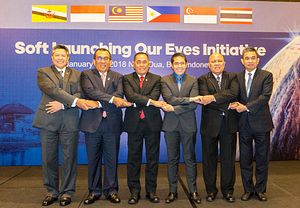As with previous years, this year’s iteration of the Shangri-La Dialogue (SLD), Asia’s premier security summit held in Singapore, saw no shortage of regional defense issues in the spotlight, from the South China Sea to the evolving shape of U.S. commitment to the region (See: “Trump’s Indo-Pacific Strategy Challenge in the Spotlight at 2018 Shangri-La Dialogue“). But for several Southeast Asian states at the SLD, as important as those other regional developments were, the foremost preoccupation was the threat posed by terrorism.
For close observers of Southeast Asian security affairs, that this should be the case is of course no surprise. As I have noted in these pages, a series of terrorist incidents over the past few years have made clear that terrorism in the subregion has emerged as a threat to a level not seen since after the September 11 attacks, from the siege by Islamic State-linked militants in the southern Philippine city of Marawi last year to the attacks in Surabaya, Indonesia, which took place last month (See: “ASEAN’s Post-Marawi Islamic State Challenge”). With this fresh on mind, was little surprise that the terrorism threat continued to factor into the discussions at this year’s SLD.
Part of that conversation was about the evolving nature of the threat. Over the past years, ASEAN defense officials have been warning about some of the features of this recent wave of terrorism, including the increasingly decentralized nature of groups, with sleeping cells and lone wolf attacks; the increasing use of social media and other forms of advanced technology; and new and more sophisticated methods of recruitment and operation. Indonesian Defense Minister Ryamizard Ryacudu, in his remarks at the SLD, characterized this as a “third generation threat” of terrorism and radicalism following the post-Al-Qaeda generation and the post-Islamic State (or Daesh) generation.
Another part of the conversation was about varying counterterrorism responses among states. Though those responses have varied, a few common threats in the discussion were clear. One of these was government officials reinforcing the need for a more comprehensive, whole-of-government approach to counter the terrorist threat. To be sure, this is a common talking point within counterterrorism, and there have been various ongoing attempts to realize this already. Indeed, Singapore, which is holding the ASEAN chairmanship this year, has proposed a “Resilience, Response, and Recovery” framework for counterterrorism which epitomizes such a comprehensive approach (See: “Singapore’s ASEAN Chairmanship: What’s on the Security Agenda?”).
But countries were also keen to reinforce this point at the SLD. Perhaps most striking in this regard were the remarks given by Philippine Defense Secretary Delfin Lorenzana, who touched on the need for responses in various areas including reforming the educational curriculum in Islamic schools, working with the private sector to manage content that could be tied to terrorist attacks, and monitoring the entry of clerics from other countries that might spread the kind of hateful rhetoric that might draw recruits into terrorism.
There was also a reaffirmation of the need for countries to engage through a wide range of mechanisms to address the threat. As I have noted previously in these pages, there have been a variety of bilateral, subregional, and regional mechanisms that ASEAN states have been utilizing with external partners to address the terrorism threat as well as related threats, with some prominent examples being the trilateral patrols in the Sulu-Sulawesi Seas between Indonesia, Malaysia, and the Philippines and the Indonesia-led ‘Our Eyes’ initiative focused on intelligence sharing (See: “What’s Next for the New ASEAN ‘Our Eyes’ Intelligence Initiative?”).
Officials highlighted some of the current initiatives and future endeavors in this respect. For instance, Australian Defense Minister Marise Payne highlighted the recent subregional terrorism meeting in Perth that was held recently, which Indonesia has agreed to host next in 2019. Singapore Defense Minister Ng Eng Hen also announced that Singapore would be hosting a Track 1.5 counterterrorism symposium in October and was also working to build a network of experts to counter chemical, biological, and radiological (CBR) threats via the ASEAN Defense Ministers Meeting (ADMM) framework.
Ryacudu, for his part, also once again reiterated that the Sulu Sea trilateral patrols could be further expanded. Though regional states involved in the patrols and related maritime security cooperation have already mulled or carried out expansion in some sense to include other Southeast Asian states like Singapore and Brunei as well as external actors like United States, Japan, and Australia, Ryacudu’s remarks suggested that further expansion could also be likely. That is an interesting characterization for several reasons including the fact that it leaves the door open for the realization of China’s interest in being part of this as well (See: “A US-China Role in the Sulu Sea Trilateral Patrols?”).
To be sure, these approaches are not without their challenges, and those were discussed among delegates in the sessions as well as in conversations on the sidelines of the SLD. For one, there are broader structural issues, from lingering suspicions among states to capacity constraints, that continue to slow the advancement of some of these initiatives. For another, some state responses to terrorist threats have raised other concerns, be it assaults on democracy and human rights or the undermining of civil-military relations (See: “Indonesia Spotlights Mentality Challenge in its Military Modernization”).
Such challenges, and discussions about them, reinforce the point that confronting the terrorism threat continues to be a difficult and complex task for regional states as well as for academic and policy communities. And with the terrorism threat and other related threats showing few signs of disappearing anytime soon, those conversations will no doubt continue in forums such as the SLD.
































